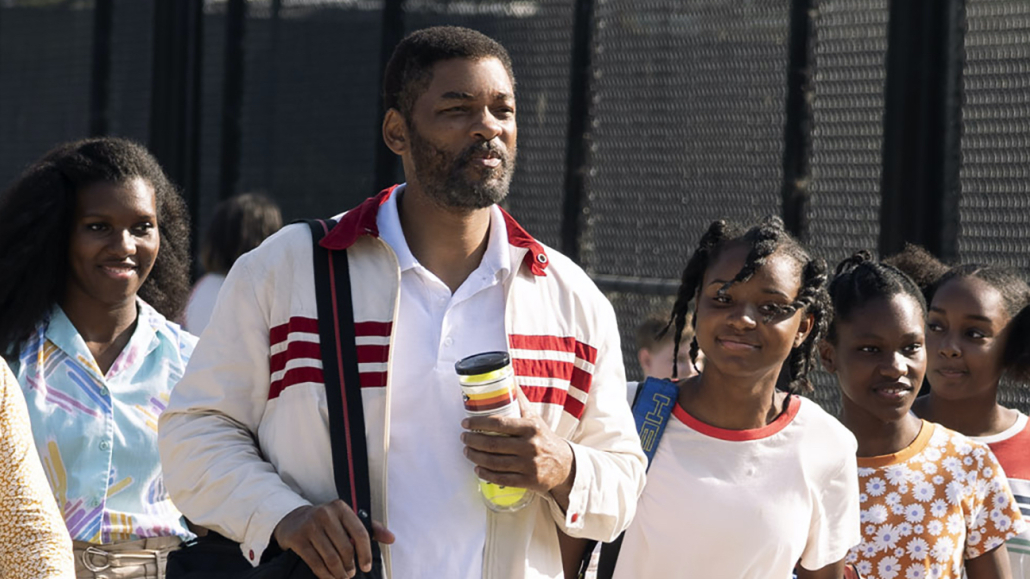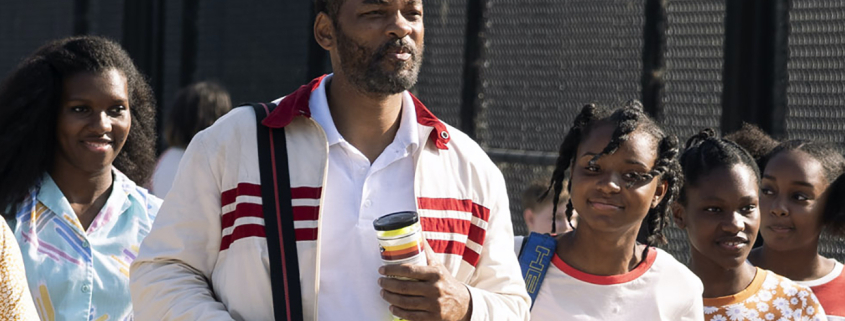‘King Richard’ biopic drops the ball

“King Richard” attempts to contextualize the early years of Venus and Serena Williams’ tennis careers and the influences of their coach and father. (Photo courtesy of Anne Marie Fox)
Venus and Serena Williams are two of the most accomplished and captivating athletes the world has ever seen. Both sisters are former world No. 1 tennis players, with 30 combined grand slam singles titles, 18 grand slam doubles titles, 122 WTA titles, eight Olympic gold medals and more than $136 million in prize money under their belts.
As Black women in a predominantly white sport, Venus and Serena faced an unusual set of roadblocks, starting with their earliest days practicing on the run-down public tennis courts of Compton, Calif. Guiding them past these obstacles and nurturing them toward success, by way of a bold, brazen and optimistic 78-page career plan, was Richard Williams: their father, coach and cheerleader.
After hearing about the lofty paychecks top tennis players receive, Richard crafted his lengthy manifesto mapping out an exact career path for his daughters, a document written before they were even born. Never having played the sport competitively himself, Richard relied on guile and a dogged persistence to push his daughters to the top.
With “King Richard,” director Reinaldo Marcus Green attempts to contextualize the Williams sisters’ extraordinary, unconventional rise in tennis by targeting the early stages of their junior careers. As young girls, Venus and Serena were most influenced by their imposing, larger-than-life father-coach.
In a virtual roundtable attended by the Daily Trojan, Will Smith, who plays the titular “King Richard,” shared his passion for portraying Richard and how an interview featuring Richard and Venus influenced his own parenting.
“I fell in love with Richard Williams. That was 20 something years ago. And when the opportunity to be a part of this came up, that was the first thing that I remembered,” Smith said. “I knew I wanted to show a father protecting a daughter like that, to the world.”
Tennis fans may enjoy some of the technical talk about strokes and footwork and stances, and there is much to enjoy in the quippy script loaded with witty one-liners and stirring advice. Smith, and Aunjanue Ellis, as Venus and Serena’s mother and matriarch Oracene, or “Brandy,” are standouts rightfully gaining Oscars buzz for their performances.
But in the 144-minute film, every narrative and directorial choice rules out another direction that could have taken place. Ultimately, the focus on this brief time period limits the film’s depth, offering Richard as a dominating father without a dynamic force to play against.
It’s as if the filmmakers decided to give us the young, supposedly unformed Williams sisters to avoid the hard work of giving each of them a distinct personality. The girls are portrayed as blank slates, an ironic choice given the vivid and powerful people Venus and Serena each turned out to be.
This desire to shine a light on Richard’s unorthodox leadership methods is understandable, but the movie falls short here, too. The story is about Richard, but the script cannot paint a full picture of his complicated persona while only examining these four years in the middle of his life. Brief mentions of Richard’s upbringing in Jim Crow-era Louisiana are scattered throughout the film, but we don’t get a full sense of what made him the man he became.
Many Black men in the 1950s South in the 1950s faced horrifying racism, but only he raised two world champions who changed the way professional tennis is played.
For a movie called “King Richard,” many questions about Richard go unanswered. Where did his ambition come from? Who had the biggest impact on his life? Who shaped his perspective? How did he foster the belief that he could coach his two unborn daughters into becoming all-time greats without extensive tennis experience?
The film glosses over a wide-ranging buffet of worthy topics — from racism to gang violence to classism to sexism to police brutality — but never commits to their complexity. At one point, a short news clip depicts the murder of a Black man by the Los Angeles Police Department playing on the Williams’ living room TV. The family watches on for a couple of seconds … and that’s it. Not only did this scene not directly relate to the central plotline, the film failed to mention police brutality at any other point during the film. This scene read as a tangential, lazy attempt to address a hot-topic issue.
Venus and Serena’s tennis careers span nearly three decades during which they experienced cruel, heinous, blatant racism and sexism — not the kind playing on a background TV, but personal and in their faces. Because of the filmmakers choice to focus on Richard and not on Venus and Serena, they missed the opportunity to create a much grittier and emotion-packed drama that could have linked Richard’s experiences with his daughters’ own battles, making the point that racism and sexism are not experiences of a past generation; both issues are alive and well in sport and in the world we send children into every day.
Instead, only Richard’s experiences in this restrictive four-year time frame were touched on and specific instances of these issues in the sisters’ lives were glossed over or omitted entirely.
The story lacks sufficient tension, partly because we all know how Venus and Serena’s careers turned out. This problem is overcome to some degree in the film’s second half when the focus turns briefly to the all-important relationship between Richard and his wife Oracene.
When the couple’s conversations take center stage, Richard’s character flaws are exposed, offering a different look into the Williams’ home life. The valuable switch from Richard’s to Oracene’s perspective finally makes this feel like more than just a recitation of someone’s cleaned-up bio.
On the other hand, a flash-forward to 2001 when Venus withdrew before her scheduled semifinal match against Serena could have set up some real drama and brought racism to the fore. Richard and the sisters were accused of match fixing. A nearly all-white crowd booed and hurled racial slurs at Serena during her final while Venus and Richard, sitting in the stands watching, were harassed and verbally attacked.
The sisters boycotted the tournament for 14 years, underscoring how even respected champions were not safe from prejudice and cruelty. Viewers will also not know from this film that gang violence killed Yetunde, the girls’ eldest sister, nor that Venus was docked points in the 1999 Australian Open when her beaded hair was declared a “disturbance.” They wouldn’t know about the vile body-shaming Serena faced throughout her career or the head of the Russian Tennis Federation referring to Serena and Venus as “brothers” and saying “it’s scary when you really look at them.”
With all of its merits, the movie leaves an audience longing for the far more poignant stories that could have been told about these extraordinary lives.

